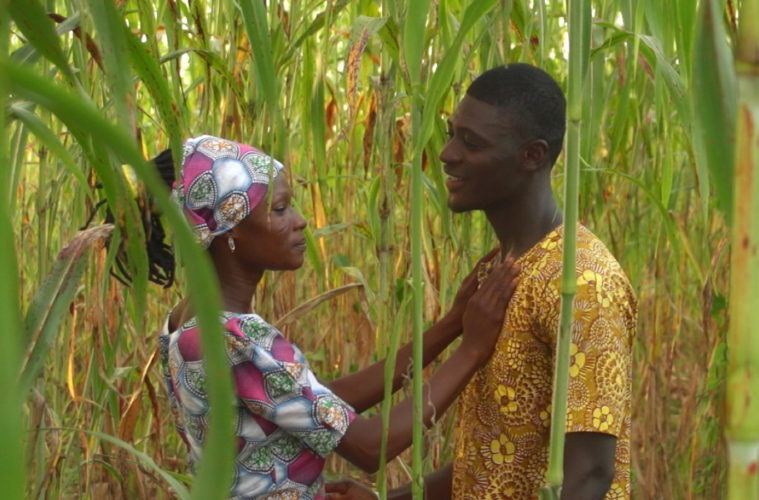Nakom is the first movie produced in Ghana’s Kusaal language, made by directorial duo T.W. Pittman and Kelly Daniela Norris after the former’s Peace Corps stint in the village of Nakom. Filmed in Nakom and starring non-actor villagers, the film follows Iddrisu (Jacob Ayanaba) as his father’s death forces him away from the modernized world of a med student and back to his farming village home.
Thanks to the non-actor cast and no-nonsense direction, it’s easy to be swept up in what seems like a mixture of documentary and narrative. This is how people live in the remote Ghanan villages. The subject carries such a wealth of inherent style that the camera barely has to do anything. A casually beautiful film, it takes your breath unexpectedly with great swatches of bright green crops or the midnight tracking of a moonlit bicycle ride.

By letting social tradition unfold before us, its sense of realism encourages us to slip into the culture like second nature, thus allowing instinct to take over. It’s easy to believe all the interactions, with their unique etiquette and tradition seeming unscripted until a character says something to remind us that a plot point is about to occur or must be furthered. When this happens, it’s usually that the writer’s confidence in their audience is waning, but Pittman and Norris embrace us with such a fullness of Ghana’s life that even simple reminders of structure are jarring.
Most of the immersion can be attributed to the cast and their framing. Allowing Iddrisu and his family space, with few shots dedicated to one villager, the characters are built with their physical relationships. How they sit near each other, how they greet each other. Ayanaba brings a mournful, heavily-lined face to his starring role, weathering decisions with a hardened resolve distinct from the restless energy of his household’s women — their subservience buzzing with hope for the future.

Sadly, much of this is underserved by a script equally overplotted and underwritten. We get lost in subplots while characters full of potential dry on the vine. An unexpected pregnancy, the intersection of technology and traditional farming, the choice between medical school and home, and various romantic entanglements — covering the course of a year between the death of his father and the funeral, the planting of his farm and its harvest, Iddrisu experiences a great deal. These vignettes never feel like chapters or even the lyrical understatement of poetry, but rather sentences skimmed while flipping through a book.
The film builds to its conclusion without building its main character, bringing us to a decision-making point which, because we’ve only seen Iddrisu act with an aloof responsibility, would feel out of left field no matter what. Which isn’t all bad — but instead of a finely sketched character, we get a blurry spot on a high-resolution picture of a village. However, once the film’s harrowing final decision is made, following all of its indecisive interludes and underwritten characters, the result is perfect simplicity. These directors could extract power from this setting in any language, but it’s best when they use none at all.
Nakom screened at the 2016 New Directors/New Films Festival and is currently seeking U.S. distribution.

